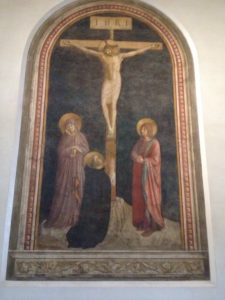The one God and the setbacks of monotheism in the Old Testament
In the early days of the Christian Church, anyone who converted to Christ should conform to the basic principle of monotheism, i.e. the belief in only one God. Polytheism believes in a multiplicity of gods.
For a Jew, monotheism is the founding principle of the revelation of the Old Testament. But actually, the practice was not always followed. People conformed to the law of Moses which guaranteed monotheism, but secretly they practiced idolatry. Some kings and a large part of the population worshiped various gods, despite the dire warnings of the prophets.
Idolatry cause of destruction
In the last decades of the two kingdoms, first in Israel in the north, then in the south, in Judah, kings had engaged in idolatry out of political calculation. They wanted to please or especially not to displease the powerful Assyrian and Babylonian kings who dominated them politically and influenced them religiously. The prophets, especially Jeremiah denounced repeatedly this idolatry.
The prophets hoped people would return to a sincere and genuine worship of the true God. But the point of no return in the idolatrous disobedience had been reached. It had caused the destruction of the Jerusalem Temple and the exile of the people to Babylon in 587. After 70 years of exile, monotheism had finally solidly established itself in practice.
At the time of Jesus Christ, the monotheism of the Old Testament was well established and claimed against any other way of perceiving the divine.
The multiple gods of pagan traditions
A pagan, attracted by Christianity, had to accept and internalize a concept opposite to its traditional understanding of the divine. For the lower classes, a multitude of deities, such as Zeus Apollo, Minerva, etc peopled the world. These simply reflected the habits and flaws of humans. They multiplied and exacerbated them at the discretion of their power and often of their harmfulness.
Two worldviews divided the intellectuals.The Platonic dualism conceived a real and good spiritual world opposed to an unreal and bad world, which would have been created by a lower deity. For the Stoic pantheism, there was a God that encompassed the whole universe. So there was no more distance between God and man, who has a spark of the divine in himself.
An insolvable equation:
There is a big difficulty for a Jew who practices an exclusive monotheism, and also for a pagan who takes the apostles of Christ for pagan gods, as it happened in Lystra.
In Lystra, there sat a man who was lame. He had been that way from birth and had never walked. He listened to Paul as he was speaking. Paul looked directly at him, saw that he had faith to be healed and called out, “Stand up on your feet!” At that, the man jumped up and began to walk.
When the crowd saw what Paul had done, they shouted in the Lycaonian language, “The gods have come down to us in human form!“Barnabas they called Zeus, and Paul they called Hermes because he was the chief speaker.
Act 14.8-12 NIV
This raises at first glance an insolvable equation:
Is Jesus Christ both man and God?
“Jesus is the Messiah, the Lord.” Can Jesus, a Jew of Nazareth, a man like others, living in a known family of a small town, be the messenger chosen by God from all eternity? Can he be “the Son of Man sitting at the right hand of the power of God and coming in the clouds of heaven” (Matthew 26.64). Then Jesus would be Lord, just like God. Jesus would be God!
Is the Holy Spirit God?
At the same time, the salvation promised by God, accomplished by Jesus Christ, would come into the Christian life through a third actor, the Holy Spirit, who has the same divine nature as the other two. But then, what allows us to say that Jesus Christ, this man called God or Lord, has a nature totally different from pagan deities?
Trinitarian monotheism and plurality of persons
A double challenge for the Jew and the Gentile
– Letting the Jew understand that the Trinitarian monotheism is consistent with some notion of plurality without falling into polytheism
– Showing the pagan, inclined to accept a multiplicity of deities, what is the specificity of the biblical Trinity both as a principle and in its persons.
A work of salvation common to three persons, but designed by one God
If the work of salvation, jointly carried out by the three persons, can be a strong indication of their common divinity, how can we recognize that this unity has its origin in one God?
How can we then reconcile this plurality of persons and therefore of actions with a fundamental monotheism?
Specificity of monotheism
– In the Old Testament
It is necessary to first return to monotheism as the base of the Old Testament.
“Hear O Israel: the Lord our God, the Lord is one ” (Deuteronomy 6.4), repeats “It is the Lord who is God. Besides him there is no other “(Deuteronomy 4.35 and 39) and Isaiah 46.9” I am God, and there is no other; I am God, and there is none like me. ”
These texts emphasize the unique and specific character of God against the temptation of multiplicity. “Specific” because there is only one true God, the Lord who revealed his name to Moses: “I am who I am.”
He is the only one who has all the attributes of divinity. He is not a god among others, the most important perhaps. No he is “I AM”. And he claims to be the only one who exists at the exclusion of all others.
– In the New Testament
This principle is confirmed in the New Testament. To the Jewish scribe who questions him about the greatest commandment, Jesus recalls the monotheistic proclamation of Deuteronomy 6.4:
“Hear O Israel, the Lord our God, the Lord is one.”
Three times in pagan context, Paul also says that “there is only one God.”
• against the multiplicity of Corinth idols:
“We know that that an idol is nothing at all in the world, and there is no God but one.” (1 Corinthians 8.4)
• when he exhorts the believers in Ephesus to unity:
“There is one Lord, one faith, one baptism, one God and Father of all, who is over all and through all and in all”. (Ephesians 4.5-6)
• when he recommends to Timothy to pray for all men:
“For he (God) wants all men to be saved and come to a knowledge of the truth. For there is one God, and one mediator between God and men, the man Jesus Christ.” (1 Timothy 2.4-5)
To be continued
C. S.



